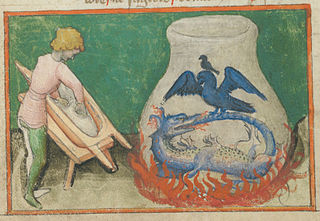
Alchemy is an ancient branch of natural philosophy, a philosophical and protoscientific tradition that was historically practised in China, India, the Muslim world, and Europe. In its Western form, alchemy is first attested in a number of pseudepigraphical texts written in Greco-Roman Egypt during the first few centuries AD. Greek-speaking alchemists often referred to their craft as “the Art” (τέχνη) or “Knowledge” (ἐπιστήμη), and it was often characterised as mystic (μυστική), sacred (ἱɛρά), or divine (θɛíα).
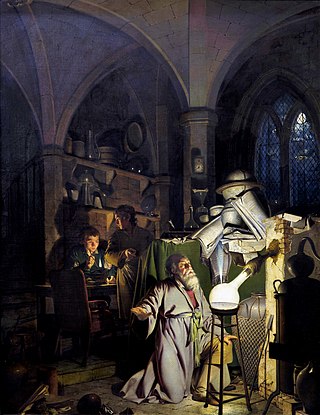
The philosopher's stone is a mythic alchemical substance capable of turning base metals such as mercury into gold or silver; it was also known as "the tincture" and "the powder". Alchemists additionally believed that it could be used to make an elixir of life which made possible rejuvenation and immortality.
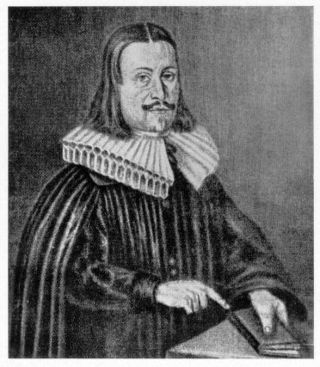
Andreas Libavius or Andrew Libavius was born in Halle, Germany c. 1550 and died in July 1616. Libavius was a renaissance man who spent time as a professor at the University of Jena teaching history and poetry. After which he became a physician at the Gymnasium in Rothenburg and later founded the Gymnasium at Coburg. Libavius was most known for practicing alchemy and writing a book called Alchemia, one of the first chemistry textbooks ever written.
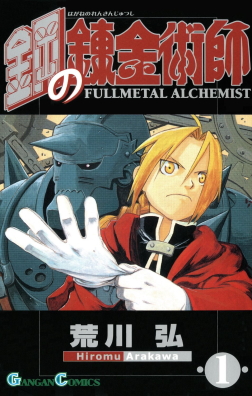
Fullmetal Alchemist is a Japanese manga series written and illustrated by Hiromu Arakawa. It was serialized in Square Enix's shōnen manga anthology magazine Monthly Shōnen Gangan between July 2001 and June 2010; the publisher later collected the individual chapters in 27 tankōbon volumes. The steampunk world of Fullmetal Alchemist is primarily styled after the European Industrial Revolution. Set in a fictional universe in which alchemy is a widely practiced science, the series follows the journey of two alchemist brothers, Edward and Alphonse Elric, who are searching for the philosopher's stone to restore their bodies after a failed attempt to bring their mother back to life using alchemy.

Michael Sendivogius was a Polish alchemist, philosopher, and medical doctor. A pioneer of chemistry, he developed ways of purification and creation of various acids, metals and other chemical compounds. He discovered that air is not a single substance and contains a life-giving substance—later called oxygen—170 years before Scheele's discovery of the element. He correctly identified this "food of life" with the gas given off by heating nitre (saltpetre). This substance, the "central nitre", had a central position in Sendivogius' schema of the universe.
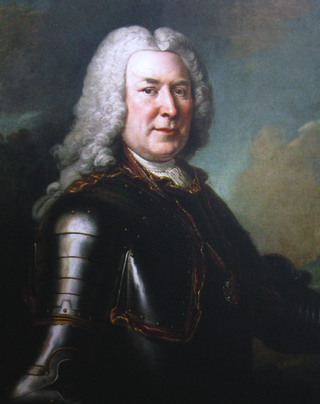
Prince Michał Fryderyk Czartoryski (1696–1775) was a Polish nobleman, the Duke of Klewań and Żuków, magnate, and Knight of the Order of the White Eagle. He headed Poland's Czartoryski "Familia".

The Czartoryski coat of arms is a Polish–Lithuanian coat of arms, a variant of the Pogoń Litewska arms. It has been used by the Gediminid Czartoryski family.

The House of Czartoryski is a Polish princely family of Lithuanian-Ruthenian origin, also known as the Familia. The family, which derived their kin from the Gediminids dynasty, by the mid-17th century had split into two branches, based in the Klevan Castle and the Korets Castle, respectively. They used the Czartoryski coat of arms and were a noble family of the Polish–Lithuanian Commonwealth in the 18th century.

Fullmetal Alchemist 2: Curse of the Crimson Elixir is the second role-playing video game for the PlayStation 2 based on the series of the same name. It is the prequel of sorts to Fullmetal Alchemist and the Broken Angel. The game has much improved visuals than the previous title, as well as all dialog being voiced over. To help boost sales, Square Enix decided to release the game with a bonus DVD in the United States containing the second and third episodes of season two of the Fullmetal Alchemist anime series, since the show took a four-month break in its Adult Swim broadcast. This DVD contains only English audio, with the shortened version of the second opening theme song "Ready Steady Go" by L'Arc-en-Ciel and the shortened third ending "Motherland" by Crystal Kay.

The House of Sapieha is a Polish-Lithuanian noble and magnate family of Ruthenian origin, descending from the medieval boyars of Smolensk and Polotsk. The family acquired great influence and wealth in the Polish–Lithuanian Commonwealth during the 16th century.
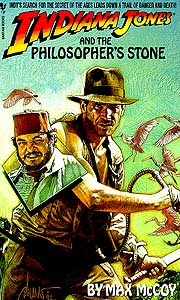
Indiana Jones and the Philosopher's Stone is the ninth of 12 Indiana Jones novels published by Bantam Books. Max McCoy, the author of this book, also wrote three of the other Indiana Jones books for Bantam. Published on April 1, 1995, it is preceded by Indiana Jones and the White Witch and followed by Indiana Jones and the Dinosaur Eggs.

Johann Friedrich Böttger was a German alchemist. Böttger was born in Schleiz and died in Dresden. He is normally credited with being the first European to discover the secret of the creation of hard-paste porcelain in 1708, but it has also been claimed that English manufacturers or Ehrenfried Walther von Tschirnhaus produced porcelain first. Certainly, the Meissen factory, established 1710, was the first to produce porcelain in Europe in large quantities and since the recipe was kept a trade secret by Böttger for his company, experiments continued elsewhere throughout Europe.

Guzów is a village in the administrative district of Gmina Wiskitki, within Żyrardów County, Masovian Voivodeship, in east-central Poland. It is approximately 6 kilometres (4 mi) north-west of Wiskitki, 10 km (6 mi) north-west of Żyrardów, and 47 km (29 mi) west of Warsaw. It is the birthplace of statesman and composer, Michal Kleofas Oginski (1765-1833).

Dorota Miśkiewicz is a Polish singer, songwriter, composer, and violinist.

Fullmetal Alchemist: The Sacred Star of Milos is the second Japanese animated science fantasy action film based on Hiromu Arakawa's Fullmetal Alchemist series, released in 2011. The film was first announced after the airing of the final episode of Fullmetal Alchemist: Brotherhood. The Japanese premiere was on July 2, 2011. Those who attended the movie in theaters in Japan received an exclusive manga volume titled Fullmetal Alchemist Volume 11.5 ~Tabidachi no Mae ni~.
Johann of Laz, or Johannes von Laaz, Joannes de Lasnioro, was a Bohemian alchemist during the first half of the fifteenth century.
Królewicz was the title given to the sons and daughters of the king of Poland, later the Polish–Lithuanian Commonwealth. It was similar in its distinctiveness to the Spanish and Portuguese title of infante, also reserved to the children of the monarch. Though, it was used only to denote one's status as a King's child. Królewicz and królewna has no direct equivalent in other languages and was translated to the English prince and German Prinz, like dynasts of a royal house. Królewicze since the 16th century could not also be regarded as and equivalent to the princes of the blood, because the Polish monarchy was not hereditary since 1573, when after the death of the last Jagiellon king, future Henry III of France was elected. In official Latin titulature children of Polish kings were often styled as Poloniae princeps or princeps Poloniae, meaning Prince/ss of Poland or Polish prince/ss. In more official way, the full style of sons of monarchs was Dei Gratia regius princeps Poloniae et Lithuaniae for the sons.

János Bánfihunyadi, better known by his Latinized name Johannes Banfi Hunyades or his pseudonym Hans Hungar, was a Hungarian alchemist, chemist and metallurgist. He emigrated to England in 1608 and built a reputation among the academic circles of England and Hungary, associating with such figures as the alchemist Arthur Dee, astrologer William Lilly, physician Jonathan Goddard and scientist Kenelm Digby.
Solomon or Salomon Trismosin was a legendary Renaissance alchemist, claimed possessor of the philosopher's stone and teacher of Paracelsus. He is best known as the author of the alchemical works Splendor Solis and Aureum Vellus.
















